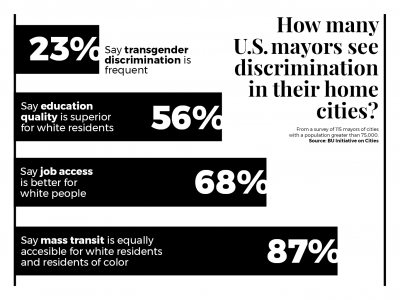
A report published by the National League of Cities and the Boston University Initiative on Cities found that U.S. mayors believe immigrants, transgender individuals, African-Americans and Muslims are the most discriminated groups in their cities.
Mayors from 115 highly-populated U.S. cities were interviewed for the study about how civic leadership plays a role in combating race-based discrimination.
While the study covered broad mayoral perspectives from around the country, Katharine Lusk, founding executive director of the IoC and advisory board member of the BU City Planning and Urban Affairs Program, said Boston officials are taking initiative to create a more accepting atmosphere for residents.
The publication highlighted a 2016 town hall forum, hosted by Boston Mayor Martin Walsh, which marked the first dialogue between the City and community stakeholders. The discussion promoted open communication “to close racial gaps in the region and to also create new mechanisms for the city that confronts its past,” Lusk said.
Overall, Lusk said, the City intends to create a more equitable environment and start prioritizing upgrades to public works and transportation throughout Boston.
The report also states that 68 percent of mayors indicated job access was better for white people in their cities. Abdirahman Yusuf, executive director and co-founder of the Somali Development Center, said his social services agency provides job training for Somalis and other African groups in Boston.
From language barriers to traditional views of women in the workfield, Yusuf said African immigrants are faced with a variety of cultural adjustments upon moving to the United States.
“There’s always this fear of what people don’t know, whether it’s the employer side or the immigrant side,” he said.
Carmen Reddick, 24, of South Boston, said, as someone who has faced discrimination, she believes this is a present issue in Boston.
“You’re not taken seriously with what you are offering, and they would rather take someone else that’s more of a majority rather than a minority,” Reddick said.
Massachusetts Immigration and Refugee Advocacy Coalition Director of Communications Marion Davis said her organization provides legal assistance for naturalization to the Boston population of 28 percent immigrants so they can obtain work and advance economically.
“I think the administration in Boston actually works very hard to make sure that immigrants are treated well and have every opportunity to integrate into our economy and into cultural life and social circles,” Davis said.
Rather, Davis explained, the issue lies in structural segregation within neighborhoods like Back Bay and East Boston that do not often intermix. People often think “you should assimilate, [but] we use the word integration … and we think of integration as a two-way process,” Davis said.
When immigrants seek employment, they must be proficient in English and have received their certification in the United States, she explained. Therefore, regardless of their education and native profession, immigrants are placed at the “bottom of the socioeconomic scale,” which Davis said is a form of discrimination that is “built into the system.”
Many transgender individuals also face discrimination when it comes to obtaining jobs with accepting workplace environments — the study found that 63 percent of mayors believe transgender discrimination occurs across the nation as a whole, compared to 23 percent who reported a lot of transgender discrimination in their city alone.
Mason Dunn, executive director of the Massachusetts Transgender Political Coalition, said his advocacy organization targets local, statewide and federal activism.
Dunn explained that his organization’s efforts have led some local businesses to install all-gender or gender-neutral restrooms.
Through education and collective action, the MTPC promotes the protection of the 2016 Massachusetts transgender anti-discrimination law, he said.
When asked about quality of primary and secondary education, over half the mayors surveyed — 56 percent — said they thought education quality was superior for white residents, compared to residents of color, the report showed. Some of the disparities they mentioned were teacher quality, building maintenance and classroom resources.
Tyra Sidberry, 68, of Dorchester, said she insists on the improvement of vocational schools in lower income neighborhoods like Roxbury and Dorchester because they need more funding.
“[Public education] touches everything,” Sidberry said. “If we can figure out the schools, a lot of it will take care of itself.”
Access to transportation and other aspects of urban infrastructure were also key areas of interest for the mayors who were surveyed. Eighty-seven percent of mayors said they thought access to mass transit was equal for their white residents and residents of color.
The report also noted that public transit access in some neighborhoods “may be inequitable,” with some neighborhoods having better access to new train cars, while others only have access to the less-reliable city buses.
Edward Byrne, 69, of Brighton, said he appreciated the Massachusetts Bay Transportation Authority Green Line extension, which allows residents of Somerville, Cambridge and Medford easier access to Boston. However, Byrne said he was upset with the lack of monetary funding in the MBTA.
“They call it a rapid transit system, but there is nothing rapid about it,” Byrne said. “It gets you from A to B in any given time, but it will get you there eventually.”












































































































